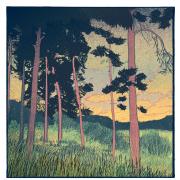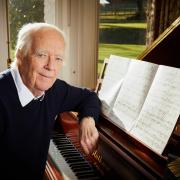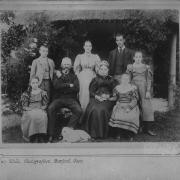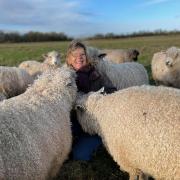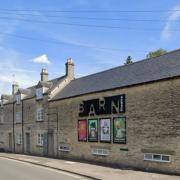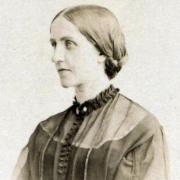Katie Jarvis visits Sir Nicholas Mander at Owlpen Manor to talk about the third volume of his intriguing family history. With ‘tales of jealousy and false identity; of bastardy, bankruptcy and betrayal; war, revolution and murder; of pilgrimage and exile’, it’s quite the read

The Cotswold country, with its scattered settlements of incomparable limestone – lichenous, and luminous in tints of dun and gold, of old vellum, ochre and oatmeal and pearly-grey – can claim to be the most glorious of the landscapes of southern England
Owls Among Ruins, Nicholas Mander
The puppies are in disgrace. (‘Refractory’ is how Sir Nicholas Mander rather generously describes them.) Frieda, the Wirehaired Vizsla, and Kamili, the Rhodesian Ridgeback *whisper it* broke into Lady Mander’s larder this morning and stole the weekend salmon. There is no excuse for this.
What’s more, when your home is Owlpen – a Tudor Grade I manor that morphed into an Arts & Crafts paradise – the answer to the theft does not lie in your local B&Q.
‘I need to have some sort of lock on the larder,’ Lady Mander says, giving a hard stare to the (somewhat large and disappointingly unrepentant) miscreants.
Sir Nicholas has already rejected several of her more pragmatic suggestions; but a compromise has been reached.
‘Today we’re going to put up something in keeping with the Arts & Crafts door. I’m more of a philistine – more into keeping my dogs out of my food.’
I love visiting Owlpen, one of England’s most heavenly houses; not so much haunted (though Lady Mander will tell you it most definitely is) as a ghost in its own right. A spectre you can see right through to a long-lost age of doublet and hose; quintain and tilting; oak parlours where the lord of the manor would preside over venison feasts.

I love talking with the Manders, too.
She, a free-spirited Swede, whose childhood meant running wild.
He, raised in a world still defined by governesses and nannies; forbidden to mix with village children; driven to boarding school by the gardener.
‘I put a bomb under all that,’ Lady Mander laughs.

SIR NICHOLAS Mander has recently published the third volume of a distinguished family history. The first journeyed back to 1750, when the Manders began to lay the foundation for chemical works in Wolverhampton; an ahead-of-the-curve business that, during the next century, would become a world leader.
His second volume moved away from upright, public-serving industrialists to delve into a side of the Manders that (were it to have existed at the time) would never have made their Facebook pages: ‘tales of jealousy and false identity; of bastardy, bankruptcy and betrayal; war, revolution and murder; of pilgrimage and exile’.
The third volume (enchantingly entitled Owls Among Ruins) he explains – with typical modesty – strayed-but-accidentally into the realms of autobiography.
Hoorah that it did.
Laurie Lee wrote that his generation saw, by chance, the end of 1,000 years’ life.
Sir Nicholas – while of a younger generation – glimpsed that descending dusk, too. But while Laurie Lee witnessed it from a damp cottage, deserted by a hapless father, Sir Nicholas sketches a rather different side of the millennium story.
He was born in 1950, 13 years after Cousin Geoffrey had given Wightwick (an imposing Victorian half-timbered manor, with a world-class art collection) to the National Trust. Sir Nicholas’s grandmother, Monica, lived at Kilsall Hall (grey gables; framed by an avenue of limes). Brought up in an age of servants, she was baffled by cookery (other than Shrewsbury biscuits, apricot jam and risotto) but a source of fun and laughter. With a booming enunciation (‘a cut-crystal yaah’) (I adore these descriptions), she was an aficionado of kindly works: visiting widows; opening village fetes, jumble sales and bazaars.
‘She was also frugal,’ Sir Nicholas tells me. ‘You’d pour yourself a glass of water, and she’d say to you, ‘Don’t fill it up!’


(My favourite story – indulge me in this – is of her hiding in the fireside cupboard to avoid the vicar’s wife. Or, indeed, letting the grandchildren play with her father, Humpah’s, mountaineering pick he’d used to secure his path across the ice fields of the Matterhorn. An anecdote that should be straight from Evelyn Waugh.)
For Sir Nicholas, childhood meant taking meals in the day nursery, while seeing off less-favoured governesses. (Poor Mrs Perkins found herself stuck in a bathroom, thanks to strategically-wedged linoleum).
Dressing-up boxes needed no help from yet-to-be-invented Disney Stores: soldiers’ uniforms with medals, and 18th-century frock coats that had bedecked previous Mr Manders, offered the real thing.
English country houses we now have to pay to enter – in the form of visitor attraction or hotel – were, in those days, friends’ pads in which to play. A conga with the freckled Bridgemans of Weston took young Nicholas dancing past van Dycks and Lelys. Holidays on the Isle of Wight saw the family call on the poet Alfred Noyes who – partially sighted – would bathe on his private beach, guided back to shore by the voice of his wife, Mary.
These stories bring alive names that now live on in National Trust guide books. Alan Clutton-Brock, the last laird of Chastleton, a Slade professor and art critic, who’d bemoan that his family had ‘rather lost out in the War’. (The Civil War, of course.)
The Wingfields at Barrington, who inadvertently discovered a Gainsborough in a drawer while searching for matches.
The gloriously eccentric (weren’t they all) Eustace Robb, squire of Great Tew, who preferred his village to fall into noble decay rather than cede ground to ‘weekenders, commuters and incomers.’

Interesting to me is how different so many of the big-house owners of yore were from the glitterati of today. They certainly weren’t luxuriating in the splendour enjoyed by their ancestors; often their lives – struggling to maintain these money-eating behemoths – were difficult and shabby.
Hugo – one of the Manders’ five children – pops in to say ‘Hello’ as we chat.
‘Ah,’ he interjects. ‘Great Tew! You talk about that in your book!’ He turns to me. ‘Do you know who the most famous inhabitant of Great Tew now is?’
‘Well,’ Sir Nicholas answers for us both. ‘One of the royals looked at it…’
‘Wrong. Wrong. David Beckham. He bought a network of barns at Great Tew and he’s done them up to the tune of millions and millions of quid. Just a few agricultural barns that he’s turned into a completely contemporary modern-living-type space. Not a crumbling pile which he has to renovate.’
‘But meanwhile the pile is crumbling…’
‘Meanwhile the pile is crumbling. Exactly! That’s the point.’
‘The house with all its history…’ Sir Nicholas laments.
Ah, yes. The Great Tew Circle: the eminent group of early 17th-century Oxford theologians, philosophers and poets – Johnson, Carew, Suckling, Cowley, Waller - who met regularly in Lord Falkland’s Cotswold seat.
Hugo shakes his head. The desire to abandon heritage for underfloor heating is anathema to him. ‘In one of our holiday cottages, we’ve an 18th-century cupola, which desperately needs removing and replacing - and we simply can’t afford to do it. So in the attic, completely closed off, we’ve a few buckets underneath the leaks.’
The occasional guest might consider that antediluvian. ‘But it’s something we, as a family, consider to be quite a normal thing.’

THE STORY OF how the Manders came to be at Owlpen is well rehearsed.
Nicholas and Karin (or Kajsa, as he fondly calls her) met while he was in his second year at Cambridge, awarded his year’s top scholarship to Trinity College.
As they talk together, I have to smile – for what an attraction of opposites they proved to be.
‘Chalk and cheese,’ Lady Mander agrees. She brought up in Scandinavian freedom: ‘As children, we ran wild. We had the most amazing time.’
‘But I suppose children run wild in different ways,’ Sir Nicholas muses. ‘We were galloping our ponies over infinite fields. There was a social world but it was very circumscribed – only other county families. Parents and grandparents and great grandparents had all known each other for generations.’
She was dead against sending their children to prep boarding school, as he had been. (‘Potential empire-builders.’)
‘I wouldn’t have it. Can you imagine, being sent away without your teddy?’
But, while they may not have agreed on everything, both of them knew the instant they laid eyes on Owlpen that they had found their home-for-life. It wasn’t an obvious asset: it cried out for vast amounts of care and lavish sums of money - this early Tudor manor and estate on the edge of the Cotswolds, cradled in a valley ‘like cupped hands’.
‘I think I quote Diderot [in the book]’: Vous y étiez avant que d'y entrer, et vous y serez encore quand vous en sortirez.
‘It was just home.’


Here, they established a smallholding, rearing local rare breeds of livestock; keeping goats; Karin spinning straight off a fleece. As they worked outside, passers-by would take them for gardener and nanny.
Other more staid local lairds mostly thought them mad.
It was, indeed, a very different life from that of Manders past.
‘My father, on his estate farm, used to enjoy driving the tractor at harvest. That was about it. And the generation before, when his father died leaving various farms – they’d never been mentioned. It wasn’t considered good manners to say we had land and farms – just irrelevant.’
The stories Sir Nicholas tells in his book are too many for this magazine, sadly. The pages are peopled by fascinating friends – Norman Jewson, the great Arts & Crafts architect-designer. Jim Lees-Milne, the country house expert, beloved for his gossipy, learned, fascinating diaries.
‘He was a diffident, shy person; elegantly dressed always.’
‘I didn’t like him. I didn’t like him full stop.’
‘He was sharp. A real interest in art and architectural history.’
And then the more strange amongst the guests who’ve stayed in their popular holiday cottages: the daughter of Imelda Marcos; and (very much separately) Samantha Lewthwaite (unbeknownst to the Manders at the time), one of the Western world’s most wanted terrorists.
They’ve made such a success of it, the two of them. Bringing back a lost estate of such beauty and grace. Everything was there – right down to traces of Jacobean paths that striated the garden. It just needed someone to find it.

Lucky Owlpen, I say to them both. Not only that you loved it, but that you had the knowledge and skills to rescue it.
‘There wasn’t much protection when we came here,’ Sir Nicholas says. ‘There were no conservation officers; people were quite happy somebody had taken it on at all. I remember my sister saying she’d have taken away that stewing stove’ – he nods to an ancient cooking-range behind me – ‘which is a rare example – probably only a few left in the whole country. Maybe early 17th century.’
Still use it?
‘We’ve often thought of it.’
‘It wouldn’t work; you need ventilation. It wouldn’t even be fun.’
‘So one does wonder what will happen after us. Maybe people won’t have quite such an exaggerated…’ Sir Nicholas begins to say.
But Lady Mander is busy thinking. ‘I suppose I could, if push came to shove. If we ever don’t have electricity; instead of cooking over an open fire, I could use that one…’

Owlpen Manor is near Uley, GL11 5BZ.
Owls Among Ruins, £12.99 including p&p, can be ordered from owlpen.com, which also gives information on how to plan a visit.




